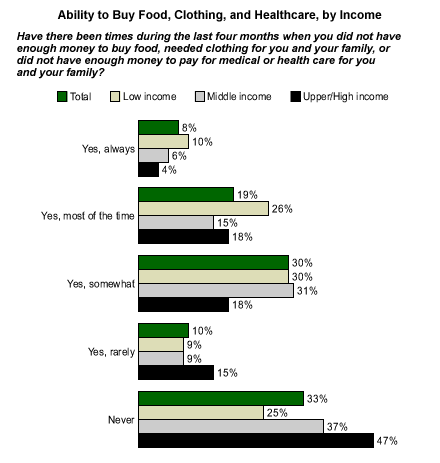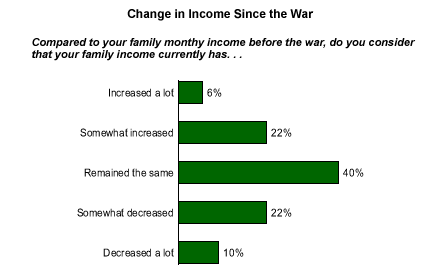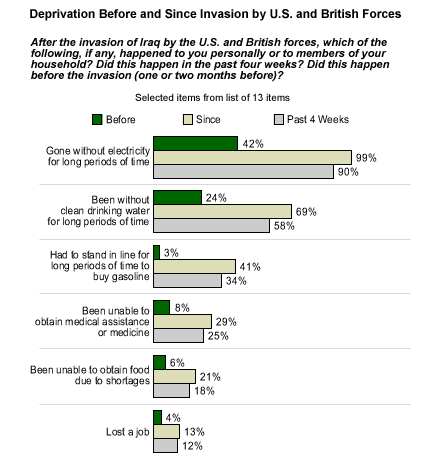The citizens of Baghdad face a host of challenges that promise to persist for at least the near future. In a Nov. 24 National Public Radio broadcast, a spokesman for Iraq's Electricity Ministry said this winter will be hard on people if electricity outages continue as predicted. In that same story, a spokesman for Iraq's Oil Ministry said that stockpiles of heating and cooking fuel are low, which could also contribute to serious winter hardships. These are just two of the many challenges that serve as a backdrop for employment problems among a people struggling toward economic stability.
As part of Gallup's landmark survey of Baghdad residents conducted last August and September, respondents were asked a variety of questions about hardships and challenges faced both before and after the invasion. Among them: What was daily life like in Iraq's capital city now, and how did that compare to the situation immediately after the invasion -- and how did this contrast with life during the months prior to the invasion?
Twenty-seven percent of Baghdadis told Gallup that during the past four months (which at the time coincided with the end of major hostilities) they did not have enough money to pay for needed clothing, food, and healthcare either "always" or "most of the time." This level of deprivation, although broadly felt, was higher among those at the bottom of the income spectrum (36%) than among those in the middle (21%) or at the top (22%).

When Baghdadis were asked to compare current family incomes to what they had earned prior to the war, 4 in 10 said the figure had remained the same. Twenty-eight percent said that personal family incomes had increased, and roughly the same number said they had decreased.

Thinking about life since the invasion, many Baghdad citizens described deprivations in a variety of basic services -- including clean drinking water, medicine, food, electrical power, and gasoline. Sabotage of water, petroleum, and electrical lines occurred throughout Iraq after the invasion, further disrupting an aging infrastructure. Indeed, although 4 in 10 (42%) of Baghdad's citizens reported long periods without electricity before the war, virtually all (99%) said they have experienced this situation since the invasion. While one in four (24%) reported that they had experienced long periods without clean drinking water before the war, that figure nearly tripled (to 69%) in the post-invasion period. Standing in long lines for gasoline, which just 3% said they did before the invasion, had become relatively commonplace: 41% reported this experience after the invasion.
The number of Baghdad residents who said that they had been unable to obtain medical care or medicine since the invasion was somewhat lower, though still a sizable 29%, compared with 8% in the months before. While only 6% reported food shortages prior to the war, 21% claimed to have experienced them since the invasion. Only 4% said they had suffered job losses before the invasion, but 13% had lost a job in the months since. Virtually all of these deprivations had decreased to some extent by the late July and August period just before the survey, but none of them had approached their pre-war levels.

Bottom Line
As the United States begins to set a timeline for turning over control of Iraq to the Iraqis, it is clear that there are many important humanitarian issues to address first. With continuing power outages, and escalating levels of violence experienced in recent weeks, the mettle of Baghdad residents is still being tested on a daily basis.
